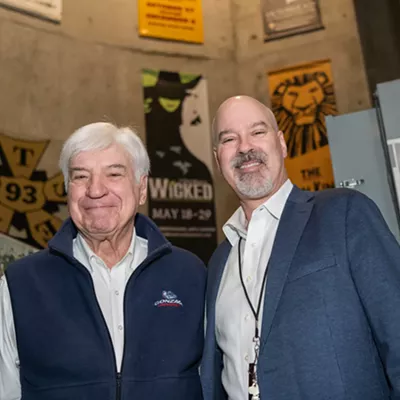It's a long way from growing up on an apple orchard outside Twisp, Wash., to a seat at the table with the Pope in Rome, but that's the path traveled by Spokane Bishop William Skylstad. Just after being one of only two American bishops to attend a summit on sexual abuse at the Vatican, Skylstad shared his thoughts on the crisis in the Catholic Church with local reporters last Friday at the Chancery in downtown Spokane.
Skylstad told the gathering that he is optimistic the bishops will find a solution to these problems: Church leaders knew about serious cases of sexual abuse of minors by priests and then did little to reprimand those individuals. The bishops meet in Dallas on June 13-15.
"This is not the first time the church has experienced a tremendous challenge," Skylstad told the group. "I truly think that it's a moment of grace for us as a church. As hurtful and as painful as it is, it is a moment of grace -- an opportunity as we look to the future."
His is a view not heard much in the American media, which has, for the past few months, reported heavily on the outrage over the abuse cases revealed in Boston and other parts of the nation. Pundits were not impressed by the April 23-24 summit in Rome, citing the lack of any solid policy to emerge. Skylstad took that criticism head-on, arguing that change will come after the Dallas meeting.
"People accuse Rome of not responding very quickly to this, but it's amazing, I think, to see the urgency being expressed by calling this meeting very, very quickly," Skylstad said. "People had very high expectations that all sorts of wonderful things would happen. [But] we need to remember that this is a work in progress. Whatever work we did in Rome was in preparation for the meeting of bishops this coming June."
Skylstad believes the outline of a policy that would apply to all churches in the U.S. is taking shape. Among many elements, he said it should include reporting all instances of suspected abuse to civil authorities, establishing a lay advisory board to be involved and caring for the victim and his or her family. Skylstad hopes a policy can be sent to Rome after the June meetings for the Pope's approval. But as that outline come into focus, so do the points of contention.
The idea of zero tolerance, or one strike and you're out of the priesthood, has been supported by the majority in the church, but Skylstad says a handful of leaders are reluctant not to consider special circumstances.
"It's a very sensitive and difficult issue, especially when we call ourselves to be a compassionate church and a forgiving church and a reconciling church," Skylstad said. "But the flip side to that is the tremendous amount of anger and hurt and trauma people experience just because of a single instance of abuse."
But attempting to shape a new policy is only part of the church's self-defense, and some of its other efforts may come across to an angry public as splitting hairs. Skylstad warned that there should be a better distinction drawn between confidentiality and a cover-up. And the Vatican has made a distinction between sexual abuse of adolescents and sexual abuse of children, saying the majority of cases in question involve adolescents, so they are not true pedophilia.
And the issue of homosexuality is even more explosive, as some church leaders have said the problems are caused by the failure to screen gays out of the priesthood. Skylstad tempered such statements, but he did say the correlation between homosexuality and sexual abuse is an open question for the experts to sort out. That approach, however, does not extend to the question of whether there's a correlation between celibacy and sexual abuse. Skylstad says the opinion among the clergy is that there is no connection, and he offered as proof a statement that other denominations that allow pastors to marry have sexual abuse problems, too.
"Compared to where we were 20 years ago, the sensitivity to sexual abuse now is light years away from that. And I thank God for that," Skylstad said. "I would never handle things now the way I would have 20 or 25 years ago. There's been a big, big change."
Skylstad celebrates 42 years in the priesthood this year, and he has spent it in Usk, Pullman, Spokane and as the bishop in Yakima. He has been bishop of Spokane since 1990. Just elected as vice president of the U.S. Conference of Catholic Bishops, he has been thrust into the worldwide spotlight at a pivotal moment in the modern history of the Catholic Church. In three years, he is scheduled to replace Bishop Wilton Gregory of Belleville, Ill., as leader of the American bishops, a group that has often struggled to reconcile the changing nature of its flock with Rome's rules.
But with a smile on his face and optimism shining through, Skylstad's performance on Friday contrasted to other church leaders who have seemed unwilling to face the media's glare. He was up-front on the issues, and didn't shy away from even the most difficult of subjects.
As for the Church -- one of the nation's largest non-governmental providers of public assistance -- and its credibility, Skylstad relied on the Pope's words: "A great work of art may be blemished, but its beauty remains," the pontiff proclaimed recently, adding that, "People need to know that there is no place in the priesthood and religious life for those who would harm the young,"
Skylstad elaborated: "I would hope that people here in the diocese of Spokane have not lost too much credibility with me and how we've lived our situation here in the diocese.
"We've had a sexual abuse committee going on for years, [and] I've tried to be very open. I've tried to do that very responsibly -- the best I could."




















